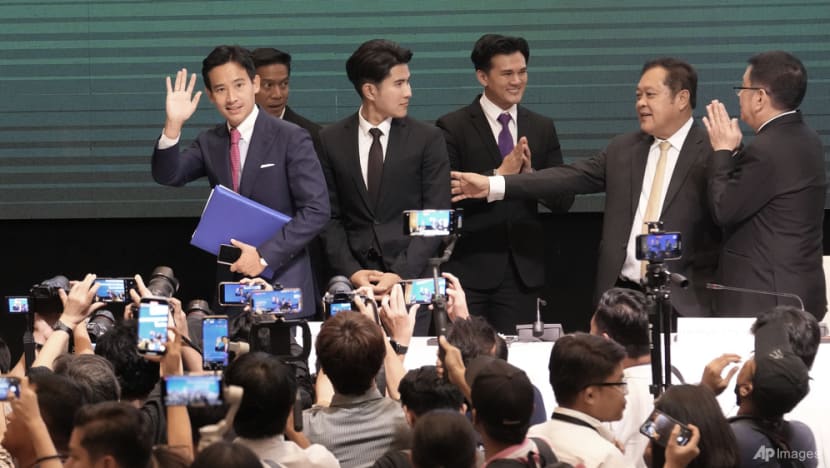Thailand’s house speaker vote crucial as newly-elected parliament opens: Analysts
The position of house speaker is significant as the role sets the agenda for laws to be deliberated in parliament, said observers.

Leader of Move Forward Party Pita Limjaroenrat (L) waves during a news conference in Bangkok, Thailand, May 22, 2023, after signing a memorandum of understanding to form a coalition government between his party and other parties. (AP/Sakchai Lalit)
Thailand's newly-elected parliament opened its first session on Monday (Jul 3), 50 days after the May 14 general election, setting in motion the process of electing the nation's next prime minister.
The progressive Move Forward Party, which won a stunning victory in the polls, has teamed up with populist Pheu Thai Party and forged a coalition alongside six smaller parties to form the next government.
To become prime minister, Move Forward’s leader Pita Limjaroenrat needs a simple majority of at least 376 votes among the 500 representatives and 250 senators.
His coalition has 312 seats and Mr Pita needs to secure the support of another 64 lawmakers to succeed in his leadership bid.
Meanwhile, all eyes are on the house speaker election on Tuesday. The fight for the powerful position has created a public rift between the two major parties.
They have been locked in a struggle over the post, with Move Forward naming its Member of Parliament Padipat Sun-ti-phada as a candidate for the seat while Pheu Thai has stood firm that it should get the role as head of the legislature.
Despite the impasse, Mr Pita has maintained that all eight parties in the coalition remain unified.
Reports said both parties are hoping to continue talks to reach a deal on Monday, ahead of the vote.
HOUSE SPEAKER ROLE CRUCIAL
The position of house speaker is significant as the role sets the agenda for laws to be deliberated in parliament, said analysts.
“The speaker plays a very important role in setting the agenda of business in the house. It has a lot of power over what goes on the legislative agenda, what is ranked (of importance) in terms of bills to be discussed in the parliamentary sessions,” said Mr Harrison Cheng, director of consultancy firm Control Risks.
Mr Michael Montesano, associate senior fellow at ISEAS – Yusof Ishak Institute, told CNA938’s Asia First: “Move Forward believes that in order to advance its very ambitious legislative agenda, a party figure needs to be the speaker.”
Mr Pita’s party has the most radical policy agenda of any party that competed in the elections.
It is proposing reforms to the military and to amend section 112 of the Thai Criminal Code, also known as lese majeste. Currently, the law makes it a crime to defame, insult, or threaten the monarch.
“Move Forward knows that unless it controls the house speaker role, there is a really good chance that any other party in that position is going to de-prioritise some of these contentious reforms,” said Mr Cheng.
“This is because other parties want to maintain some kind of peace with the military, to minimise the risk of a military coup.”
Pheu Thai has urged Move Forward to rethink its proposal to amend the law to reduce prison terms for offences against the monarchy.
COALITION REMAINS STRONG
Nonetheless, negotiations between the two main parties remain “very fluid”, said Mr Cheng, explaining the two sides understand that working together is their best chance at forming a government.
“Right now, Pheu Thai is still very much intent on working with Move Forward. While it realises that there’s a somewhat seemingly easier option of working with other incumbent coalition parties, (the move could) be seen as a major compromise among its party base. And if so, most likely in the next election, Move Forward will snap up many of the votes that have gone to Pheu Thai in this election,” he said.
Pheu Thai has proposed that should Move Forward fail to get Mr Pita elected as prime minister, it would put forth its own candidate for the role and cede the speaker position instead, said Mr Cheng.
The two parties will likely work towards an amicable agreement in fear that a prolonged impasse could trigger the military to step in.
“For Thailand, a military coup can never be ruled out. The military has shown time and again that they are not afraid to resort to that measure. If we see the security situation become significantly destabilised, the military could use it as a context to come in and restore peace and order,” Mr Cheng told CNA’s Asia First.
“That could result in various other forms of interference, that would cripple, if not oust, the civilian government that would be formed in the next month or so.”















